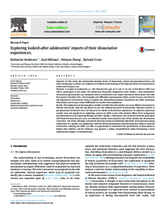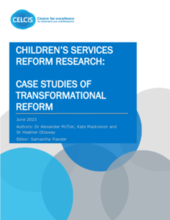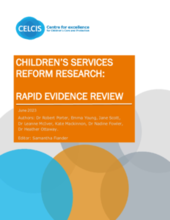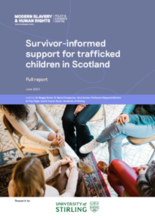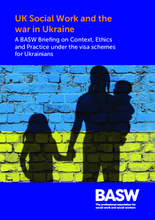Displaying 121 - 130 of 1185
In this UK-based study, the relationship between levels of dissociation, several pre-placement factors and other background variables was explored to facilitate understanding of the high prevalence of dissociation in adolescents living in care.
A group of talented young dancers from Uganda warmed hearts around the world after earning the coveted “golden buzzer” on Britain’s Got Talent.
Case studies of transformational reform programmes examined a range of approaches to the delivery of children’s services to better understand the evidence regarding systems-level integration between children’s social work/social care with health services and/or adult social care.
Strand 1: Rapid Evidence Review reviewed existing published national and international research evidence focused on better understanding the evidence associated with different models of integration of children’s services with health and/or adult social care services in high income countries, as defined by the World Bank.
The aim of this study was to fill a gap in knowledge in relation to what constitutes recovery and effective support over a longer time frame for separated children and young people who have experienced trafficking in Scotland. The study illuminates processes that have not been previously explored with this group of children and young people in Scotland.
The Young Gamechangers Fund (YGF) is a new and exciting UK funding initiative established through a dynamic partnership between the Co-op Foundation, Co-op, Global Fund for Children, Restless Development and one other funder that share a common vision for the future of youth-led change. The Young Gamechangers Fund will be co-designed with youth activists to change the way that youth-led activism, social change and movement building is funded in the UK.
In this policy brief published by Eurochild and UNICEF, researchers assess the 20 available European Child Guarantee National Action Plans (NAPs) and issue recommendations to examine their coverage of children in alternative care.
A think tank said the pandemic exposed ‘underlying fragilities’ in the social care system and ‘forced’ the issue so it is impossible to ignore.
The focus of this document is to support, inform and empower social workers across the UK in their ongoing practice and consideration of issues that arise in relation to people arriving and staying under the UK Ukraine visa schemes.
Uganda Care Leavers/Association of Care Leavers Uganda released this statement in response to the appearance of Ugandan children on an April 15 episode of Britain's Got Talent. These care leavers expressed concern about the institutionalisation of children and the need to instead promote family care for all children.

